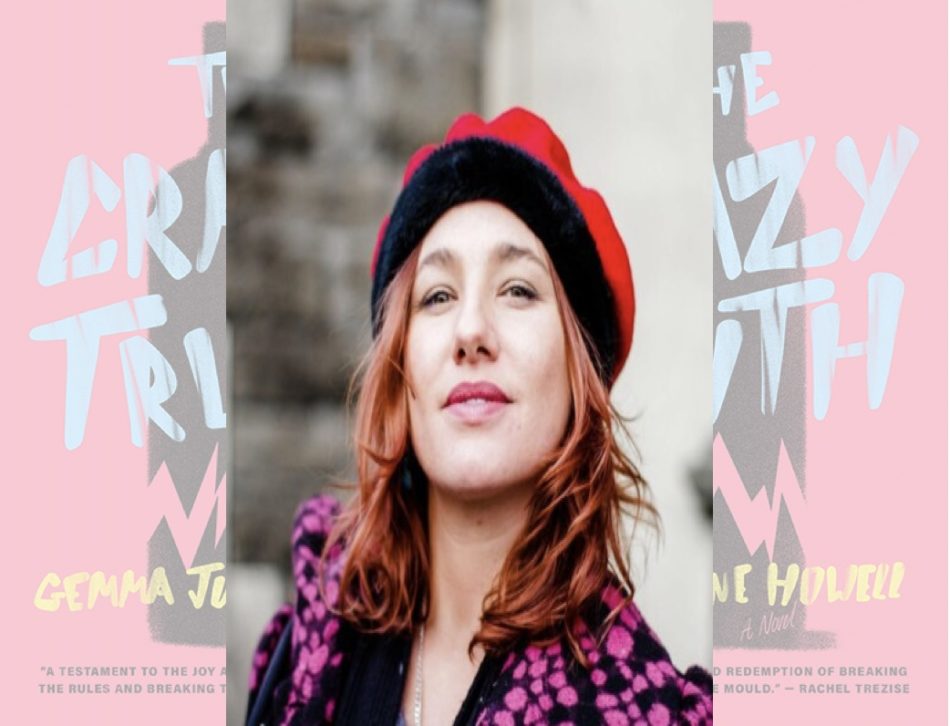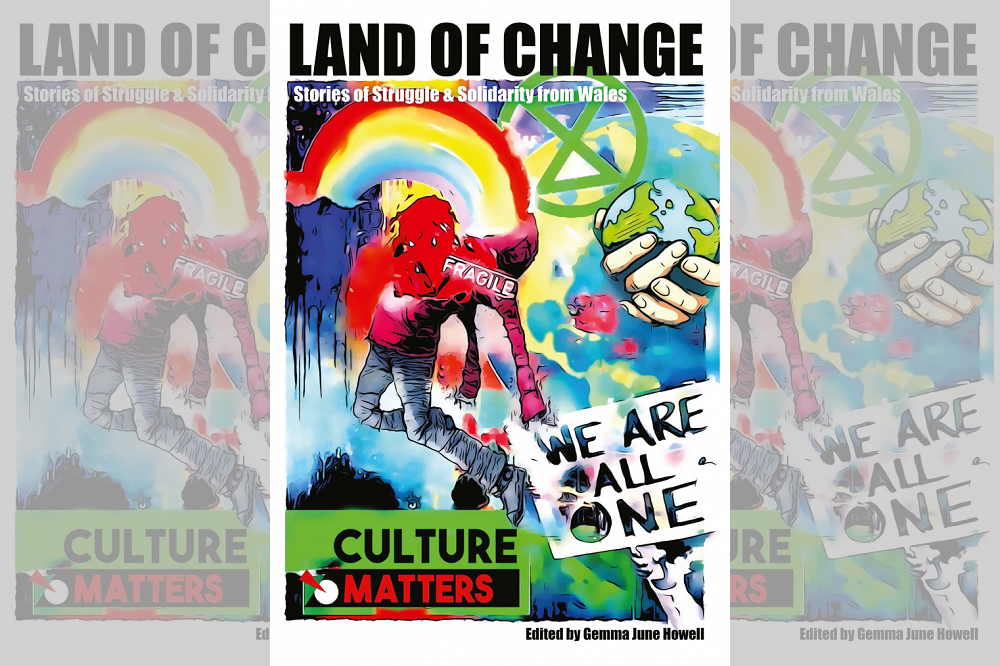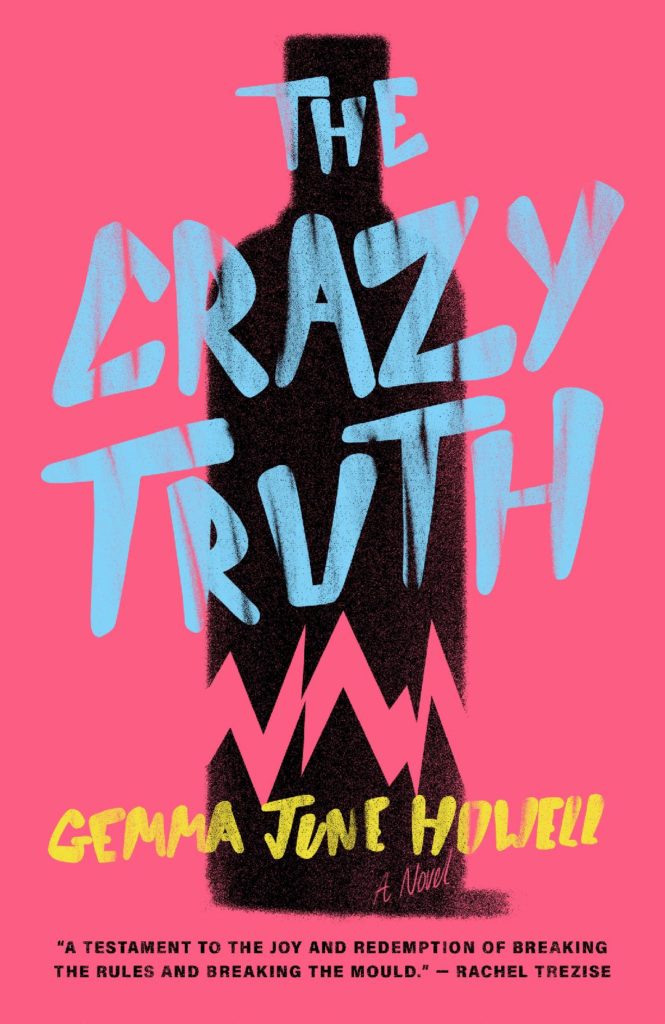The arts interview: “We aren’t meant to feel like we belong”

Adam Johannes interviews author of The Crazy Truth, Gemma June Howell
Gemma June Howell is the kind of woman who refuses to be silenced. Sitting down with her, you can sense a lifetime of words she’s been waiting to spill.
Howell didn’t politely ask to be heard – she bulldozed her way in, kicking the door down.
There is an urgency in her voice as she tells me, “The reason I wanted to write books is because I couldn’t find any other way to express myself”.
Howell is every bit the literary rebel, “I’ve always had this idea that people should get a much larger grasp of what is going on in the world. I’ve always been a non-conformist and anti-establishment,” She tells me that when she first started reading and writing the places she found solace and beauty were in the people “who were never meant to write”.
Voiceless
She pauses. “I had a lot to say, but I didn’t know how to say it.” She adds, “But I think that counts for most of us until we find our way,” cutting straight to the bone of what it means to be voiceless until, suddenly, you’re not.
For Howell writing is both about her own personal struggle and a political act. She tells me that women like her aren’t “meant to feel like we belong” in the publishing world. Voices like hers are not only marginalised, but actively ignored, “Our accents. Our backgrounds. Where we are from. We aren’t represented. We aren’t meant to feel like we belong.”
But that has only fuelled her, and Gemma June Howell’s debut novel, The Crazy Truth is exactly that—a wild, fearless explosion of the working-class experience.
Her writing is an act of defiance, refusing to conform to the sanitised narratives that dominate the literary world. Instead, Howell centres gritty, raw realities of working-class life—sexual abuse, prostitution, and political struggle—and dares the middle-class gatekeepers to look away.
Influences
“Years ago we did have brilliant people who advocated for working class people in the publishing and film industries, right here in Wales.” Howell pays warm homage to Welsh film-maker Karl Francis, from her hometown in Bedwas, and others in the tradition of “real kitchen sink dramas who “stuck up for the working class” and were unafraid to centre working class lives, before adding, “Contemporary writers like Niall Griffiths, Lloyd Robson and Rachel Trezise gave me a passport to write.”
Her other influences? A motley crew, but one that makes perfect sense in the context of her life. “There were many books given to me to read as a young girl,” she says, pausing before revealing a gem. “My grandmother had this big open bookcase. There was a book that always stays with me: Women Who Run with the Wolves by Clarissa Pinkola Estés which unearths the wild woman archetypes that have been erased in our modern idea of womanhood….”
Solidarity
Howell talks about her love for The Colour Purple by Alice Walker, calling it “the most significant book we studied at school” influencing her not only because it was written in dialect of the people whose lives it portrayed, but how it opened up race, class, gender, abuse, oppression, its explicit language and its centring of female solidarity.
The novel introduced her to African American fiction inspiring a lifelong connection to stories of resistance and survival. “Nobody made me gut-cry like Celie did,” Howell says,”At that time in Britain, I don’t think these lives had been opened up yet. Nobody I knew was writing about sexual or domestic abuse in that kind of detail.”
Howell isn’t shy about the cross-cultural connections that shape her writing. “Maya Angelou was a wonderful woman and poet…Angelou said that one of the first people she felt inspired by was Robert Burns,” beaming as she recalls a documentary where the African American poet returned to Scotland, and “sat there in the castle and listened to all of these Scottish poems”. Howell was impressed by the way the Scottish people embraced and connected with Angelou, “Poems of struggle and survival are most definitely universal”.
Working-class experience
Howell also cites Irish author Roddy Doyle as someone mirroring her own working-class experience. “The Woman Who Walked into Doors … I was seeking stories that resonated with the stories close to my heart, or things that helped me understand the world I was experiencing at that time,” she says. These novels reflected the grit, hardship, and community spirit of the estates she grew up on, a literary lifeline to a young woman who felt otherwise disconnected from the world around her.
But her influences weren’t limited to fiction. Raised in a politically charged household, she was exposed to activism. “I was thrust into a world of politics from a young age. It seemed I was dragged from one march to the next. I didn’t understand what was going on at the time, but it was important and immediate.” Howell recalls. This upbringing exposed her to revolutionary literature like Nelson Mandela’s biography and The Communist Manifesto, shaping her view of the world as inherently unequal. “Why should some people have all the power and wealth, and some people shouldn’t?” She asks a question that underpins much of her work.
It’s an idea that bleeds into her writing, pushing her towards curating anthologies like Land of Change – Stories of Solidarity & Struggle from Wales published by Culture Matters.

Land of Change
Howell’s determination to create a space that challenges elite sensibilities is nowhere clearer than her cramming almost 56 marginalised writers between the covers of a non-fiction anthology. An “act of resistance”, it is a refusal to let the stories of Wales be written by those who never lived its struggles.
“I wanted to make sure our voices were being elevated. I was thinking about the ‘new Wales’ that I experienced as a teenager when we had devolution, the bands that came through, ‘Cool Cymru’ and our new identity,” Howell explains.
Land of Change, then, isn’t just about storytelling — it is about reclaiming the Welsh past, present and future — and the voices of a people who refuse to be erased. The stories aren’t always pretty, and that’s the point.
Howell tells me excitedly about finding a festival programme from the 1980s in her nan’s belongings, chronicling the brutal police repression of New Age Travellers at the Battle of the Beanfield. There are the stories the powerful want to ignore, like the Miners’ Strike, but Howell forces them into the spotlight, “We were coming out of the pandemic, the Black Lives Matter movement was resurging after George Floyd’s death… my nan had passed away…” at the same time protest marches were going on. “I felt it was the time to bring forth the real stories of people who had fought and struggled through these battles but are painted negatively in the mainstream media”.
Once again, Howell is not here to make anyone comfortable—she’s here to make sure they listen.
The Crazy Truth
Against the tumultuous backdrop of 1984, Girlo Wolf — a character based on Howell herself — is born into Rhymney council estate, Graig-Y-Rhacca or The Rock, a world steeped in pickets and poverty — a microcosm of societal struggle. Her life embodies the harsh realities faced by so many: the long shadows of childhood trauma and mental distress loom large as she navigates a treacherous path through sex, drugs, and alcohol, The Crazy Truth is a story of resistance against a system that consistently fails women.
Trauma
Howell’s voice softens to a whisper when we turn to her semi-autobiographical novel, which delves deep into class, addiction, trauma and self-loathing. “The people my book resonates most with are the people who have come from council estates,” she tells me. “Especially council estates stuck in the middle of nowhere like little ex-mining villages. These places are still stuck in the 1970s.”

But what sets The Crazy Truth apart is the way it strips down to the raw nerves of class warfare, where the line between who gets to be a person and who gets to be a statistic is drawn in blood, spit, and broken glass.
Alcoholism features in the novel. Howell notes how class still dictates whose drinking is acceptable. “It’s okay to have a G&T or a bottle of Chablis,” she quips, “but it’s not okay to have a can of lager or a shot of sambuca.” So it’s not just what you drink, it’s about who’s holding the glass. The rich have their vices too, but theirs come with a shiny label, a nice name, a layer of respectability that never touches the lives of people like Girlo.
Survival
What’s most striking about Howell is her refusal to sugar-coat her life. Her writing is a therapeutic exercise, a process of survival. “I was always told, ‘Write what you know.’ I just needed to get it off my chest. I needed other people to read it,” she confesses. Her writing is deeply personal, but it’s far from self-serving. “As a socialist, it’s always been about the greater good, the collective.”
Even on the trauma of child abuse, Howell remains brutally honest. “These things happened to me when I was young, but you experience that one trauma, you seem to keep on attracting it”. She tells me about her ‘broken wing syndrome’, , “Trauma bonding, I think they call it. The only people I could connect with were other people who had been in the same position…,” there is real pain in her voice, as she continues, “…and that only attracted more and more trauma over the years. I couldn’t find any other way.”
Her life would become a chaotic odyssey through a jungle of trauma. “I couldn’t find anybody to love me. I couldn’t find anybody to love. Because the very people I loved were broken. But that just added and added to it, and compounded the problem on both sides.”
Howell’s is a life stitched together by pain, each new trauma adding to it, “like stitches that run through your body,” she says, “With each stitch, with each trauma, it’s pulled and it strikes you and right through your body. It can catch you out on the smallest thing.”
But in a dazzling twist, the birth of her daughter offered redemption, “I do feel when I had my daughter that all of those trauma stitches suddenly pulled together to make a beautiful rose.”
The Void
Howell is a chronicler of the ways people try to fill emotional voids. “One of the themes in the novel is this relationship to toxicity, and where is that toxicity born of? and how does that toxicity present itself?” She explains “There are many different elements to toxicity, alcohol, sex, drugs, that filling of the void, that self-loathing and self-hatred that can only be quelled with another toxic substance.”
She draws on Dr. Gabor Maté, a Holocaust survivor, whose studies on addiction and trauma clearly influenced her, “He talks a lot about how society views people with addictions as something that’s their own fault, but he sees it as the fault of how society is organised under capitalism.”
Toxicity
Maté’s concept of the “hungry ghost”— a term from Buddhism describing the insatiable need for external validation and relief — is woven throughout. “In the novel, I use the motif of the White Monkey as the hungry ghost. He flits around not only in the psyche of Girlo, but he also represents the abuser, the void, the loneliness, the toxicity and desperation.”
Howell’s novel addresses the trauma and abuse that she herself experienced, “I needed to write about it for so many different reasons. I needed to get it down on paper, and I needed other people to read it,” she tells me, “I met so many people over my life and I don’t know what version of me they have met, but I wanted people to know that this is what I’ve been through. I have survived and so can you.”
Howell’s work, however, isn’t just about reliving trauma. She looks to the tradition of writers like George Orwell, writing “very simple accessible stories are useful to convey very complex political problems.” Howell’s writing method is deeply rooted in her politics. A self-described socialist feminist, she is committed to making her work accessible to the women she grew up with—women trapped in cycles of poverty, abuse, and silence.
Howell wishes to bridge the gap between academic feminist discourse and the lived experiences of working-class women, “I want to reach the women who are trapped,” Her calling as a writer is simple, empowerment through relatable stories to ignite political consciousness.
She describes going to a “liberal feminist network meeting”, where everyone was using “the full dictionary of academic language for the women they wanted to save”, but ironically she thought that “it wouldn’t be a safe space for the women they wanted to save” who wouldn’t be able to understand their saviours and might feel intimidated by them. Howell is determined to ensure that the voices of women like her—voices that have long been excluded—are finally heard.
Accessibility extends to the structure of the novel, which defies traditional linear storytelling. “I don’t think anything is linear, or anyone’s memory would be able to place anything linearly,” Howell explains.
The Crazy Truth mirrors the chaotic, fragmented nature of trauma and survival, allowing readers to experience the disjointed reality of a life marked by abuse and loss. “Our lives don’t follow linear paths. We don’t even know who we are until we look back”
Injustice
Imagine, for a moment, experiencing a deep and corrosive pain, yet lacking the words to bring it into the open. This is what happens when those in power control our language; they manipulate the very fabric of our reality, keeping us silent and subjugated.
This is the key to understanding Howell’s work, “This book isn’t just about trauma, or abuse, or class. It’s about ‘epistemic hermeneutical injustice,” She tells me, “On the surface it looks like it’s just a ‘chavvy nobody’ from nowhere, talking shit about her shitty upbringing and her shitty life that she has to deal with on her own.”
“I wanted to make a point, just as Alice Walker did in The Colour Purple, about these hidden struggles in life, written in the dialect, that our viewpoints, our lived experiences as working class women are not taken seriously., Not only are they not taken seriously, they are not included in the grand scheme of our understanding of knowledge.”
Feminist manifesto
The work is as much a feminist manifesto as it is a novel, speaking to an “epistemic hermeneutical injustice” denying women like Howell herself the power to define themselves, but Howell insists this is not only her personal struggle, “Even though this book was about Girlo Wolf and she is the narrator, we are not alone on this journey. It’s not just about the individual journey, it’s about the collective journey.”
Her rage is palpable over the institutional sexism that stifles women’s art. “Women have been treated as amateur writers, as if it is a hobby, whereas men are considered professionals in their craft.”
And in Howell’s world, it’s not just men upholding this system. It’s women, too, who betray Girlo. Female misogyny is also revealed in the book. “They save face for the men, and save face for the patriarch.”
“The women work against one another in the book,” Howell highlights the structural forces that often pit women against each other within a system that oppresses them all. The Crazy Truth does more than document Girlo’s coming-of-age; it interrogates the entire notion of female solidarity under patriarchy, drawing attention to the cultural pressures that have warped these relationships.
Her work is a complex, layered exploration of identity, community, and resistance that positions working-class women centre-stage demanding that their voices be heard on their own terms.
A Story of Healing
Gemma June Howell is redefining what it means to be a working-class woman writer in Wales today. “I just needed to be able to make sense of what had happened to me and what was happening to me continually, and I needed to do it through words.”
Her novel is a testament that the most powerful narratives come from those who have fought the hardest to be heard, and that storytelling can be a tool for both personal and collective liberation,
Yet, for all its darkness, The Crazy Truth is also a story of healing. The act of writing has been transformative, allowing Howell to confront her past and find the sense of belonging that had long eluded her. “Finally, I have found a sense of peace. I feel at home within myself.”
Howell’s parting words are full of the same fierce determination defining her writing. “The book was meant to be an emancipatory project,” she says. “I didn’t realize that freeing myself would mean freeing others and freeing others would mean freeing myself.”
Howell is now working on the sequel The Crazy Dream, that continues where The Crazy Truth left off, following Girlo Wolf’s fight for self-acceptance, social mobility and freedom from poverty, abuse and victimhood.
Gemma June Howell’s novel The Crazy Truth is published by Seren. It is available from all good bookshops.
Support our Nation today
For the price of a cup of coffee a month you can help us create an independent, not-for-profit, national news service for the people of Wales, by the people of Wales.




